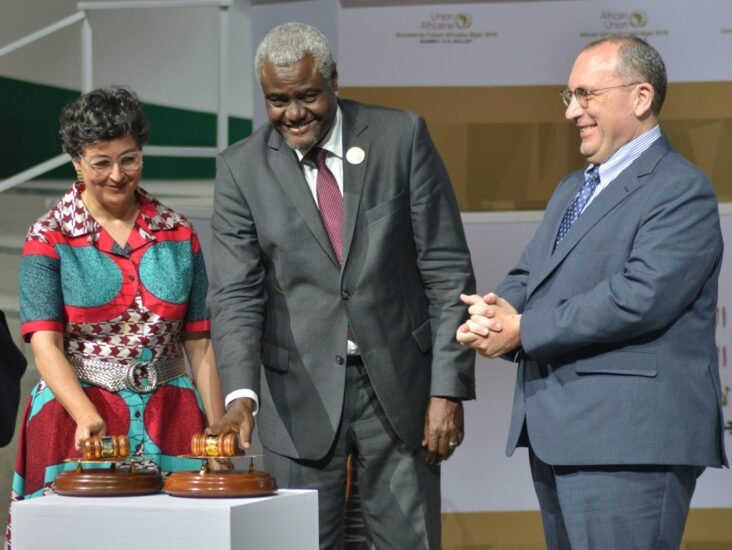But by many measures, African countries are failing to meet their transformation goals in terms of diversification, export competitiveness, technological upgrading, and productivity. Indeed, human well-being is actually falling across much of the continent.
To accelerate transformation, African countries must collaborate beyond trade to tackle shared challenges, harness regional opportunities, and enable economies to innovate and grow together by removing barriers to progress. The task is daunting, but we know it can be done. Recent events prove it.
Countering the effects of Covid-19
The Covid-19 pandemic continues to cripple the continent, setting back economic recovery across the region and fuelling a growing debt problem as governments try to spend their way out of trouble and meet urgent vaccination goals.
The damaging economic legacy of the Covid-19 crisis is likely to be prolonged across parts of Africa, with per capita incomes in many countries not expected to return to pre-pandemic levels before 2025. However, the pandemic’s impact would be far more devastating – and deadly – without highly successful collaboration and coordination among countries.
A powerful example is the Africa Medical Supplies Platform, launched by the AU and other regional partners, such as the Africa CDC and UN Economic Commission for Africa, as an immediate and integrated effort to ensure life-saving equipment got to those who needed it across the entire continent, not just within one country. In this way, AU member states put regional needs over national interests.
Further, the African Continental Free Trade Area (AfCFTA), came into effect earlier this year. A landmark achievement, the AfCFTA will open up a single market of 1.34 billion people to businesses and investors by removing tariffs among African countries. Successive rounds of negotiations set protocols for trade in goods, trade in services, and dispute settlement. After decades of aborted or underwhelming regional initiatives, the AfCFTA gives fresh impetus to integration in Africa.
Despite these successes, humanitarian needs have escalated, and the pandemic threatens to derail progress toward cherished objectives, including the UN’s 17 Sustainable Development Goals (SDGs). The WHO has said a third wave of coronavirus infections is picking up, spreading faster, and hitting countries harder. With rapidly rising case numbers and increasing reports of serious illness, the latest surge threatens to be Africa’s worst yet.
The first and immediate aim for governments must be to tackle the health crisis and increase vaccinations. Second, governments must provide support to the worst off to protect them during the Covid-induced downturn. Demands for increased social spending, and for investment in health, education, and infrastructure have all, understandably, intensified. And the pressure is only going to get stronger as by 2030 nearly one in two new entrants into the global labour force will come from sub-Saharan Africa.
The article continues below

Free download
Get your free PDF: Top 200 banks 2019
The race to transform
Complete the form and download, for free, the highlights from The Africa Report’s Exclusive Ranking of Africa’s top 200 banks from last year. Get your free PDF by completing the following form
To add to the challenges, while there is variation across countries, public debt in sub-Saharan Africa is again becoming a concern to policymakers because of the steadily increasing interest burden. In 2020, for example, interest payments reached a worrying 20% of tax revenue for the region as a whole and exceeded one-third of revenue in several cases, diverting scarce resources from critical social and development needs.
What are Africa’s solutions?
Under the backdrop of these immediate issues, it is important to keep the eye on longer-term goals that will provide real solutions to Africa’s problems. The third African Transformation Report published by the African Center for Economic Transformation (ACET) explores the critical need to give new impetus to Africa’s transformation.
African countries have largely been working in isolation. But their ability to transform depends on integrated efforts to build synergies and allow economies to scale. The solution lies in coming together to address common issues, indeed global issues with pan-African nuances, that will better enable countries to accelerate transformation.
Economic recovery hinges on countries deepening reforms that generate employment, encourage investment and enhance competitiveness while protecting the most vulnerable. To get the continent back on track and renew its transformation agenda, Africa must make greater progress on regional integration and key collaborative projects, supported by substantial additional financing and debt relief to help Africa meet its development objectives.
Above all, integrating to transform demands visionary leadership and collaboration at all levels. The AfCFTA is a welcomed and celebrated start. But integration needs to go beyond trade to creating jobs, particularly for young people, supporting digital innovation, and managing climate change through cross-border solutions.
Bottom line
Greater regional collaboration, especially through the delivery of regional public goods – such as building a well-integrated cross-border digital infrastructure and developing shared renewable energy projects – will be key to tackling frontline challenges to successful transformation.
Africa’s ability to capitalise on its huge potential rests on several factors, including good policy, strong institutions, better capacity, access to financing, private sector development, and above all else, leadership. Transformative leadership requires more than a vision. It requires political will, pragmatism, and taking the long view even when beset by immediate difficulties.

